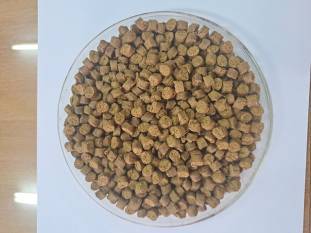KOCHI, 26 October 2024: In an attempt to promote sustainable aquaculture practices, the ICAR-Central Marine Fisheries Research Institute (CMFRI) has developed eco-friendly fish feed using black soldier fly (BSF) larvae meal.
This insect protein-based fish feed is expected to reduce dependency on traditional fishmeal, which is often linked to overfishing and fluctuating prices.
Aimed at large-scale commercial production, CMFRI transferred this breakthrough technology to Amala Ecoclean, a start-up focusing on sustainable waste management and environmental solutions. A memorandum of understanding (MoU) was signed by CMFRI Director Dr Grison George and Amala Ecoclean Director Joseph Niclavose. This collaboration will enable the technology to reach fish farmers across India.
Emphasising the significance of this technology, Dr. Grinson George, Director of CMFRI said: “The innovation promotes sustainable and cost-effective practices in the aquaculture industry”.
According to the research team at the Marine Biotechnology, Fish Nutrition and Health Division of CMFRI, the feed is highly effective in maintaining the growth rate of farmed fish species, making it a viable substitute for conventional feed ingredients such as fishmeal and soybean. “By using BSF larvae meal as a protein source, this fish feed offers a sustainable alternative to fishmeal”, they said.
Black soldier fly larvae are packed with essential nutrients, including 40- 45% protein content, along with fats, amino acids, and other vital nutrients. These larvae feed on a variety of organic wastes which make them a sustainable protein source. After processing, the larvae are converted into a defatted meal that can be easily integrated into fish feed formulations. This feed offers a balanced diet supporting the growth and health of farmed fish. The feed is proven to improve the overall feed conversion ratio, which could lead to cost savings for fish farmers.
CMFRI Director Dr Grinson George further said that this technology would help address two critical environmental concerns: waste reduction and sustainable protein source for aquaculture. “This aligns with global efforts to make aquaculture eco-friendly and reduce the environmental footprint of fish farming”, he added.
Initial trials conducted by CMFRI demonstrated that the larvae-based feed is as effective as conventional feeds, without compromising on the performance or growth of aquaculture species.
As part of the commercialisation process, ICAR-CMFRI and Amala Ecoclean will continue to collaborate on further research and development to optimize the feed for various fish species and farming conditions.























